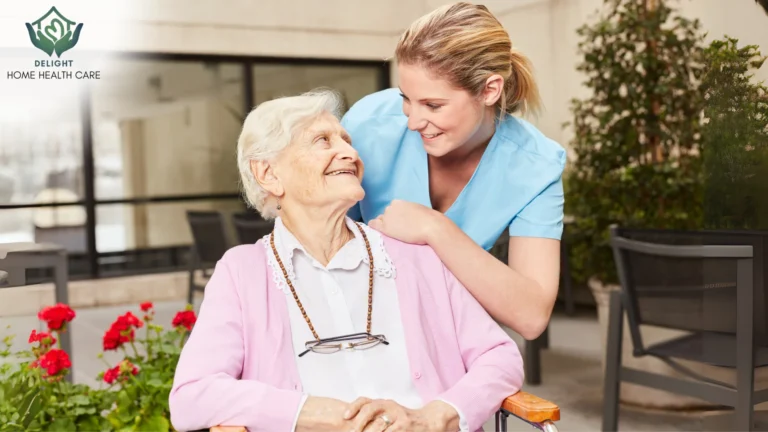-
603 Watt Blvd SW
We speak English & French!
Top 7 Signs Your Loved One May Need Home Health Care Support

Table of Contents
As our loved ones age, ensuring their well-being becomes a top priority. While many seniors strive to maintain their independence, there are often subtle and not-so-subtle signs that they might need extra help to manage their daily lives. Recognizing these signs early can prevent potential health risks, accidents, and emotional challenges.
Home health care offers a compassionate solution, providing personalized assistance that allows seniors to remain in the comfort and familiarity of their own homes while receiving the care they need. From helping with daily tasks to offering medical support, home health care ensures seniors live with dignity and safety. In this blog, we will explore the key indicators that your loved one may benefit from home health care support, helping you make informed decisions about their care and safety.
Signs Your Loved One May Need Home Health Care Support
1. Difficulty Managing Daily Activities
Daily activities, also known as Activities of Daily Living (ADLs), include essential tasks like:
- Bathing and personal grooming
- Dressing appropriately for the weather or occasion
- Preparing meals and maintaining proper nutrition
- Cleaning and maintaining the household
- Shopping for groceries and other necessities
If you notice that your loved one struggles with these tasks—perhaps their home is untidy, they’re skipping meals, or wearing inappropriate clothing—it’s a sign they might need additional support. Home health care professionals can assist with these tasks, ensuring their day-to-day needs are met while maintaining their dignity and independence.

2. Frequent Falls or Accidents
Falls are a leading cause of injury among seniors and often stem from:
- Reduced mobility or balance issues
- Poor lighting in the home
- Cluttered living spaces
- Uneven floors or rugs
If your loved one has experienced multiple falls, bruises, or unexplained injuries, it’s crucial to address the issue immediately. Home health care providers can:
- Help create a safer living environment
- Offer mobility assistance or recommend devices like walkers
- Monitor their physical condition and suggest exercises to improve strength and balance
Reducing fall risks can significantly enhance their safety and quality of life.

3. Changes in Physical Appearance and Hygiene
Pay close attention to visible changes such as:
- Unkempt hair or beard
- Dirty or stained clothes
- Body odor indicating a lack of bathing
- Neglected oral hygiene
These signs could indicate that your loved one is finding it challenging to maintain their personal care. Other physical changes like:
- Unexplained weight loss or frailty
- Poor nutrition due to difficulty cooking or grocery shopping
Home health care providers can assist with grooming, hygiene, and meal preparation to ensure your loved one stays healthy and comfortable. They can also monitor dietary habits to ensure proper nutrition.

4. Chronic Health Conditions or Recovery Needs
Many seniors live with chronic conditions such as:
- Diabetes, requiring blood sugar monitoring and diet adjustments
- Arthritis, which can make mobility and daily tasks painful
- Heart disease, necessitating medication and lifestyle management
- Respiratory issues that may require oxygen therapy
Additionally, recovering from surgeries like hip replacements or hospital stays can be overwhelming without proper support. Home health care services include:
- Skilled nursing care for wound dressing, injections, or health monitoring
- Physical therapy to aid recovery
- Medication administration and adherence support
These services are tailored to individual needs, ensuring optimal recovery and health management.

5. Social Isolation or Loneliness
Social interaction is crucial for emotional and mental well-being, but many seniors experience loneliness due to:
- Limited mobility preventing them from visiting friends or family
- Loss of friends or loved ones over time
- Family living far away or being unavailable due to busy schedules
Prolonged isolation can lead to:
- Depression or anxiety
- A decline in physical health
Home health care providers can:
- Offer companionship and conversation
- Encourage hobbies and activities to keep them engaged
- Facilitate virtual or in-person connections with family and friends
This emotional support can greatly enhance their quality of life.

6. Cognitive Decline or Memory Issues
Signs of cognitive decline include:
- Forgetting appointments or frequently losing items
- Difficulty managing finances or paying bills on time
- Repeating questions or stories
- Wandering or getting lost in familiar places
These behaviors could indicate conditions such as dementia or Alzheimer’s disease. Home health caregivers are trained to:
- Provide supervision to ensure safety
- Assist with tasks that require memory or organizational skills
- Create routines to minimize confusion and stress
They can also work with medical professionals to monitor the progression of cognitive conditions.

7. Medication Mismanagement
Proper medication management is vital for seniors, particularly those with multiple prescriptions. Issues to watch for include:
- Skipping doses or overdosing on medications
- Mixing up prescriptions
- Confusion about when or how to take medications
A home health caregiver can:
- Organize medications using pillboxes or reminders
- Ensure adherence to prescribed schedules
- Monitor for side effects or potential drug interactions
This support reduces the risk of complications and ensures that your loved one’s treatment plan is followed correctly.

Conclusion
Recognizing these signs early can make a significant difference in your loved one’s quality of life. Home health care services offer tailored solutions to meet individual needs, ensuring safety, comfort, and peace of mind for both seniors and their families. If you notice any of these indicators, consider reaching out to a trusted home health care provider to discuss your options.
FAQs
What is home health care?
Home health care involves professional services provided in the comfort of a person’s home. These services may include assistance with daily activities, medical care, and companionship.
How do I choose the right home health care provider?
Look for a provider with a good reputation, experienced caregivers, and customized care plans. Ask for recommendations and read reviews to ensure quality service.
Can home health care help with chronic illnesses?
Yes, home health care professionals are trained to manage chronic conditions, administer medications, and monitor health to prevent complications.
Is home health care covered by insurance?
Coverage varies depending on the insurance provider and the type of services required. Check with your insurance company for details about eligibility and benefits.
How do I start the conversation about home health care with my loved one?
Approach the topic with empathy and understanding. Highlight the benefits of home care, such as improved safety and independence, and involve them in the decision-making process.



